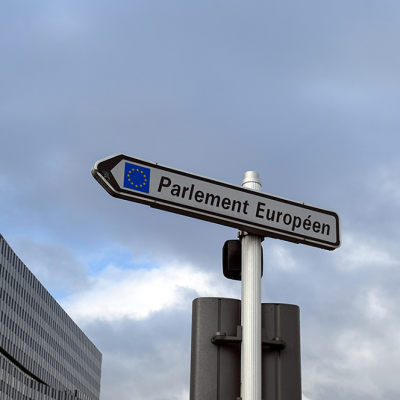European treaties and national democracies
As is the case with the tensions between the EU and Hungary, the drafting of the “Treaty” regarding the Economic and Monetary Union is once more raising the debate on the way in which the EU may influence the autonomy of national democracies. In such a context, Yves Bertoncini tries to analyse the relations between European politics and national democracies in a “Notre Europe’s viewpoint” expressing three main statements.

As is the case with the tensions between the EU and Hungary, the drafting of the “Treaty” regarding the Economic and Monetary Union is once more raising the “European democracy” debate: this time the issue is not primarily the EU’s functioning and “democratic deficit”, but the way in which the EU may influence the autonomy of national democracies, in conditions that are now more than ever in need of clarification.
1 – The European Union has a limited and targeted influence on national democratic choices
The EU’s interventions since the beginning of the debt crisis and the confusion surrounding the real effect of the new Treaty -often sustained for internal political reasons- will doubtless continue to entertain the myth of an omnipotent Europe. However, the impact of the EU’s present and future interventions on national economic policies varies greatly:
? in the “countries under programmes” (Greece, Ireland, Portugal), the EU sets its conditions. It acts temporarily working alongside the IMF and according to the latter’s mode of functioning, and helps those Member States that have de facto alienated their sovereignty towards their creditors, in exchange for fiscal consolidation and structural reforms that are subjected to hefty monitoring, during the implementation of the aid programme;
? with regard to the supervision of national budget policies, the EU may impose sanctions. The 3rd part of the new Treaty aims to reinforce the follow-up foreseen in the Growth and Stability Pact, in direct pursuance of the provisions adopted in the context of the “Six pack”. These sanctions, as until now, will only bear upon those countries that have let their accounts drift. They would not necessarily prejudge those choices elected in order to restore those accounts: it will be for example for Greek and French voters to decide in the near future which proposals they are most in favour of in this perspective.
? with regard to the coordination of national economic policies, the EU formulates recommendations. The 4th part of the new Treaty more or less reiterates the provisions of the “EU 2020 Strategy” and of the “Euro+ Pact”, the latter providing slightly more precise monitoring indicators, and counting on a slight increase of “peer group pressure”. In terms of efficiency, one may lament the fact that the EU, acts as a “super OECD” and does not have more efficient means of action. But this may be understood in terms of legitimacy – the most important being not to let believe that these simple European recommendations may question the autonomy of national democracies.
European reactions to the reforms undertaken by the Hungarian authorities confirm the diversity of the impact of EU interventions, from welcome moral and political protest on the one hand, to procedures for infringement and sanctions possible in those single areas where European law seems to have been contravened on the other. This distinction is even more imperative to establish considering the EU calls for adherence to the rule of law, except if the EU would like to be seen as weighing boundlessly on national democratic choices.
In such a context, it is necessary to tirelessly reiterate that the EU does not govern its Member states, and that, in conformity with the “subsidiarity principle”, its competencies and the impact of its normative interventions are limited. Furthermore, that if membership of the EU confers rights and imposes obligations, it allows de facto and de jure for the extensive autonomy of its Member states, as the coexistence of very diverse economic, social, environmental and diplomatic national choices illustrates it.
2 – European policies rest upon decisions which necessarily involve national authorities, in conditions that the debt crisis has revealed are in need of clarification
The 5th part of the new Treaty bears the mark of the necessary involvement of national authorities, driven by the debt crisis to make tough political decisions, not only in order to grant hitherto unseen aid packages to other Member States but also -driven by their creditors- to engage in profound structural reforms.
At the European level, these choices require a political legitimacy that logically rest with Heads of States and Governments. That one Head of State or the others hould exercise a particular “leadership” is a classical way of proceeding. However, the current crisis has reminded -through the criticisms of the ‘Merkozy’ duo- that issues relating to formal procedure are just as important from a political point of view.In order to be wholly legitimate and accepted at a national level, European representative authorities need to explain and assume responsibility for European decisions: the presidents of the European Council, the Commission and the ‘Eurogroup’ are best placed in this regard, as will be the ‘President of the eurozone summits’ foreseen by the new Treaty, if it were someone different from the three former mentioned.
The debt crisis has also placed national Parliaments at the frontline, among other reasons because the latter are solely habilitated to unblock funds granted in order to come in aid to other Member states. Their involvement will remain legitimate for as long as rescue mechanisms based on Community funding have not been put in place. They could also be very useful in exercising an ex ante control on national budgets, in the case where a European authority requested that a Parliament reviews a draft national budget: it is indeed crucial that this authority counts amongst its members representatives with a corresponding democratic legitimacy, which implies the presence of representatives of national and European Parliaments.
However, this does not entail the creation of another parliamentary institution in the context of the new Treaty, which would create a harmful confusion with regard to the EU and the European Parliament. Nor does it imply that we should ignore the primary need for a stronger control of national Parliaments on their governments when these negotiate and decide in Brussels – this deficit of national parliamentary control being one of the main sources of the ‘European democratic deficit’.
3 – The EU’s decisions stem from the balance of power between States and parties, largely defined by the dynamics of national democracies
An omnipresent consideration for decision makers, sometimes taken into account by analysts, the balance of power between States and between parties is most often negatively mentioned by observers, as if they were primarily obstacles to EU action, in spite of the fact they are the very basis of the latter’s political legitimacy.
Such is the way the balance of power between political families within European institutions operates, leading to more or less favouring economic and social policies aimed at austerity, or to moderating criticism of the Hungarian authorities, whose leaders belong to the political party which dominates Europe today, willed into power by European citizens.
Moreover, in this way operates the balance of power between Member States, whereby those who register better economic performances and political cohesion quite logically influence their partners – the case of the German authorities with respect to budgetary stability exemplifies this point, once more echoing the country’s public opinion.
Finally, this is how the balance of power operates within each Member State, varying in time and reversing itself in tandem with national elections. For example, neither ‘Greece’, nor ‘France’, nor ‘Germany’ are monolithic entities, so that the upcoming elections in these countries will also have an important impact on the definition of their national and European policies and on the evolution of the EU.
The EU is not ‘monolithical’ either: this is why there is a need to distinguish clearly between those areas that come under its competences and institutions, and those areas that are the province of national democracies, whose interactions make up the complexity, but also the essence of European politics.




